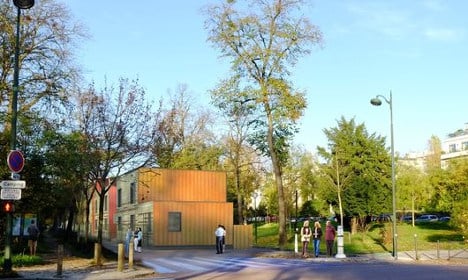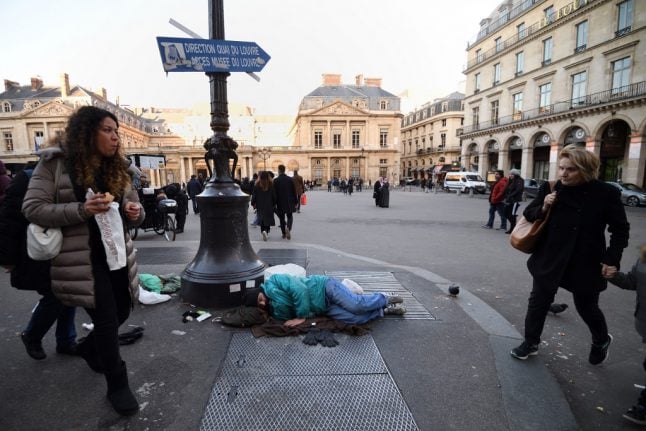“Liars,” “sons of bitches” and “bastards” were just some of the insults that were hurled at city officials as they took to the stage in the posh 16th arrondissement of Paris on Monday, to answer residents’ questions about a centre for 200 homeless people due to open on their doorstep this summer.
Residents of the plush 16th, who include some of the French capital's most well-to-do and famous are up in arms with hundreds of them turning up to Monday's volatile meeting, which had to be cut short for security concerns.
Many fear their house prices will tumble with the influx of 200 homeless people, while others say the area, on the edge of the Bois de Boulogne park will be ruined, while some point to security concerns. Others however fear it will become a migrant camp like the Calais “Jungle”, but this tile in Paris.
More than 50,000 have signed a petition in a bid to block the move.
The director of a local real estate agent who requested anonymity said that Monday’s meeting had been plagued by “an agitated atmosphere”.
“It’s clear that such a centre will have a [negative] effect on house prices in the area,” she told The Local.
An angry resident of the 16th told The Local that she felt that city officials had made the decision “without any respect for democratic procedures”.
She underscored residents’ concerns that the centre will be situated “next to Bois de Boulogne, an environmentally protected area. It is right in front of embassies, children's sport facilities… and 5 minutes from the Jardin de Ranelagh and Musee Marmottan Monet which [are] very much appreciated by foreign tourists.”
“This has the potential to create a “Calais” jungle within Paris and would take months to dismantle.
“Are we living in the USSR ? Where has democracy gone??,” she asked, adding “Paris is promoting safety, tourism and sports. I am not sure this project corresponds to this image…”

Françoise Gaujour, another local resident, said she wasn’t a “rich bourgoise”, but that the centre bothered her “not because it will house homeless people… Unfortunate men and women who we obviously need to help,” but because “it will make apartment prices fall.”
“My residential apartment, which is located in this area, has already lost 15 percent of its initial value since these construction plans were announced. This apartment is my only ‘fortune’… It’s my savings.”
“In France, we know that temporary often means permanent,” she noted about city officials assurances that the centre will only remain in the area for three years.
Gaujour said, however, that she was disgusted by the way the meeting had been disrupted by protesters, adding that many of them “weren’t even from the neighbourhood” and had come there with no intention at all to learn more about the project.
“It’s a shame,” she said.
The 16th arrondissement is one of the city’s most affluent, made up of wide avenues with tree-lined walkways, luxurious homes, and prestigious schools, but officials say it has hardly pulled its weight in accommodating society’s most vulnerable people compared with other Parisian neighbourhoods.
During the meeting, a resident of the 16th yelled out that the centre should be put up in Calais, the northern French port town which is already buckling under the strain of an influx of refugees and migrants.
While Paris City Hall insist the centre will not accommodate migrants, residents are wary with local Town Hall officials declaring it will become “the new Sangatte” – a reference to the notorious centre for migrants near Calais that was closed down in 2002.
Paris city official, Sophie Brocas, tried to calm the angry crowd saying there would be no migrants in the centre, “neither from Africa or anywhere else”.
Many of the residents targeted their anger at Socialist Paris mayor Anne Hidalgo, who has pushed for the 16th to take on more responsibility.
A chant of “Hidalgo resign” began whenever anger boiled over.
Max Guazzini, the former president of the Stade Français rugby union club of Paris and who is critical of the plans, said he had voted for Hidalgo in 2014, but that the move “will make the value of my apartment tumble”.
He also told reporters that “there are a lot of concerns regarding security, especially for women”.
The centre is scheduled to be erected in the next few weeks in an unused grassy area just off the Avenue du Maréchal Maunoury, which is across the peripherique ring road from the Bois de Boulogne – the second biggest park in Paris.
The homes will be managed by French non-profit organization Aurore, which houses around 20,000 people in France each year.
Several phone calls made to the city hall and officials in the 16th arrondisement by The Local on Monday went unanswered.



 Please whitelist us to continue reading.
Please whitelist us to continue reading.
Member comments